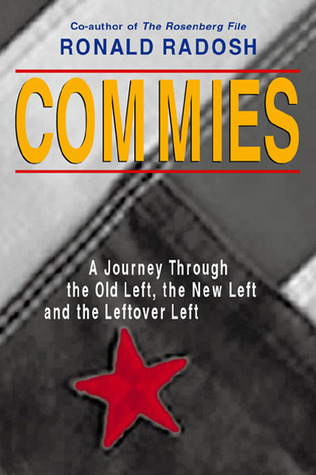“Our ideas had consequences,” observes Ronald Radosh, distinguished historian of the American left, echoing the quite un-radical Richard Weaver. The party of which Radosh was a member for most of his life conventionally is portrayed as an idealistic band in pursuit of a more humane America. Yes, its apologists admit, the left has erred from time to time—not from any intrinsic malice, but in the flawed execution of a noble creed. If, however, the author of Commies proves nothing else, he demonstrates that the left has always been a systematically illiberal campaign of subversion, operating in concert with the world’s most rogue regimes.
Radosh’s radical bona fides are impeccable. Of leftist parentage and related to the anarchist Jacob Abrams (of Abrams v. United States notoriety), Radosh was reared as a Red Diaper Baby in the de facto Soviet colony of New York City. At one point, he lived in the same building as “the notorious Soviet atom-bomb spy” Ted Hall. “My block. West 172nd Street and Fort Washington Avenue,” he writes, “was also a stronghold of numerous other Communists.” Radosh experienced his indoctrination in the radical agenda in both recreational and pedagogical settings. At Camp Woodland in Phoenicia, New York, where he sang Maoist anthems, a pair of Creek communists recruited him for the Labor Youth League (a branch of the Communist Party). For commencement speaker at Elisabeth Irwin High School (the “Little Red Schoolhouse”), Radosh’s class chose W.E.B. Du Bois, an apologist for Stalin.
The Labor Youth League furnished “a ready-made community” of radicals at the University of Wisconsin-Madison. Radosh thrived among his collegiate comrades, infiltrating campus organizations and doing battle against Madison residents. Khrushchev’s 1956 disclosure of Stalin’s atrocities did not weaken his commitment to the cause. Indeed, so intense was Radosh’s radical faith that he joined the Communist Party after the Soviet Union invaded Hungary. (Radosh returned to Madison to pursue his doctoral studies with eminent revisionist historian William Appleman Williams.)
Ascent to the upper echelon, if not the vanguard, of the New Left followed. Among other significant experiences, Radosh took a podium by force at an antiwar rally, joined Michael Harrington to visit Michael Mauley in Jamaica, and disquieted Tom Hayden with a critical review of The American Future. He was also a cofounder of Studies on the Left and later served on the editorial board of Dissent. In this latter capacity, he “became deeply involved in setting the tone for the nation’s major democratic-socialist intellectual journal.”
Radosh’s eventual disillusionment began on a trip to Cuba in the early 1970’s. For leftists, Cuba generally and Fidel Castro in particular were the incarnation of their vision: “He was the first true New Left revolutionary, a man who would not compromise, a man who promised and would build a humanist revolution that would be truly democratic—not Red; not Red, White, and Blue; but guerrilla green.” What Radosh encountered, however, failed to confirm his preconceptions of the Cuban paradise: psychiatric abuse including mass lobotomies, prevalent penury, totalitarian puritanism—in short, the Procrustean obscenity of an omnipotent regime. When he criticized these conditions during his stay and in a subsequent article, Radosh’s comrades excoriated his deviation from the herd. As one of them explained, “We have to understand that there are differences between capitalist lobotomies and socialist lobotomies.”
Becoming convinced of Julius Rosenberg’s guilt demolished another, more personal, sacred cow. “In my youth,” Radosh observes, “the passion of Julius and Ethel Rosenberg was the great cause that wedded me to the Left.” He was a participant in pro-Rosenberg rallies as an adolescent and shared an alma mater (Elisabeth Irwin) with their sons. Thus, Radosh leapt at the opportunity to vindicate the Rosenbergs when their sons established the National Committee to Re-Open the Rosenberg Case. In fact, this exculpatory purpose paved the way to his conclusion that Julius Rosenberg committed espionage. The left’s vitriolic reception of The Rosenberg File (coauthored with Joyce Milton) prompted a watershed introspection: “Although I didn’t want to be excommunicated from the church of the Left where I had worshipped all of my life, I had in fact started to question the whole project of the Left.”
A second disillusionment abroad completed the destruction of his faith. Daniel Ortega and the Sandinista revolution were the radical toast of the 1980’s, much as Castro and the Cuban revolution had been in preceding decades. The left mistook the displacement of an authoritarian regime—Fulgencio Batista’s in Cuba, Anastasio Somoza’s in Nicaragua—as the coming of free governance. But Radosh became increasingly averse to Somoza’s successors on his trips to Nicaragua. Bianca Jagger apprised him of the new regime’s expropriations, and Daniel Ortega defended the turbas divinas (“divine mobs”) deployed to suppress dissidents, while witnessing Nicaraguan peasants in refugee camps convinced Radosh that “Sandinista power in Nicaragua had to be ended.” Radosh bade an implicit farewell to his former comrades and their willful blindness in an essay written after Ortega’s 1990 electoral defeat, an event that brought his “long exile from America” to a close.
Radosh’s account of his radical voyages maintains a quiet profundity and good-humored decency. For those seeking to understand the contemporary left in all of its fanaticism. Commies is indispensable.
[Commies: A Journey Through the Old Left, the New Left, and the Leftover Left, by Ronald Radosh (San Francisco: Encounter Press) 216 pp., $24.95]

Leave a Reply